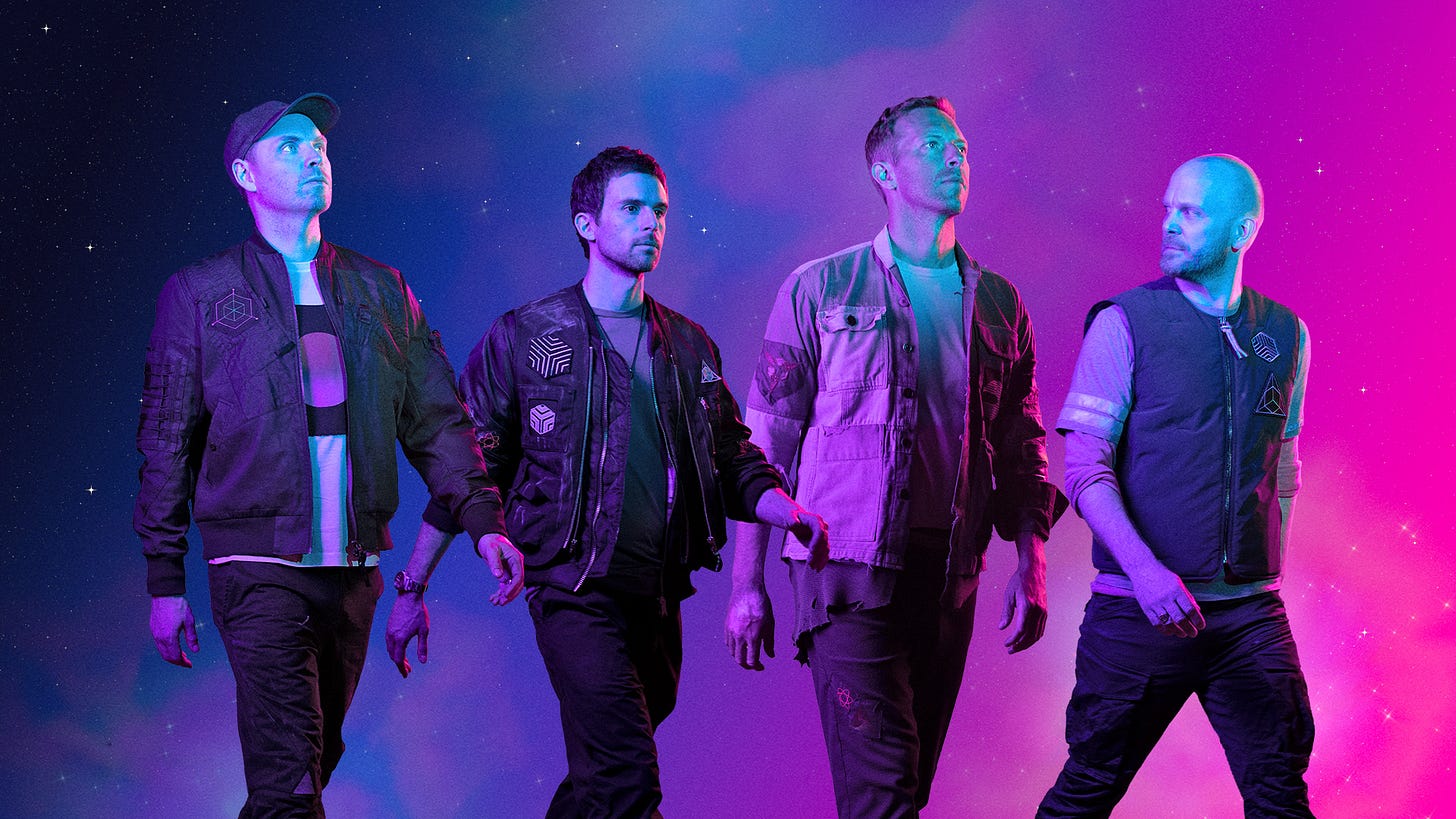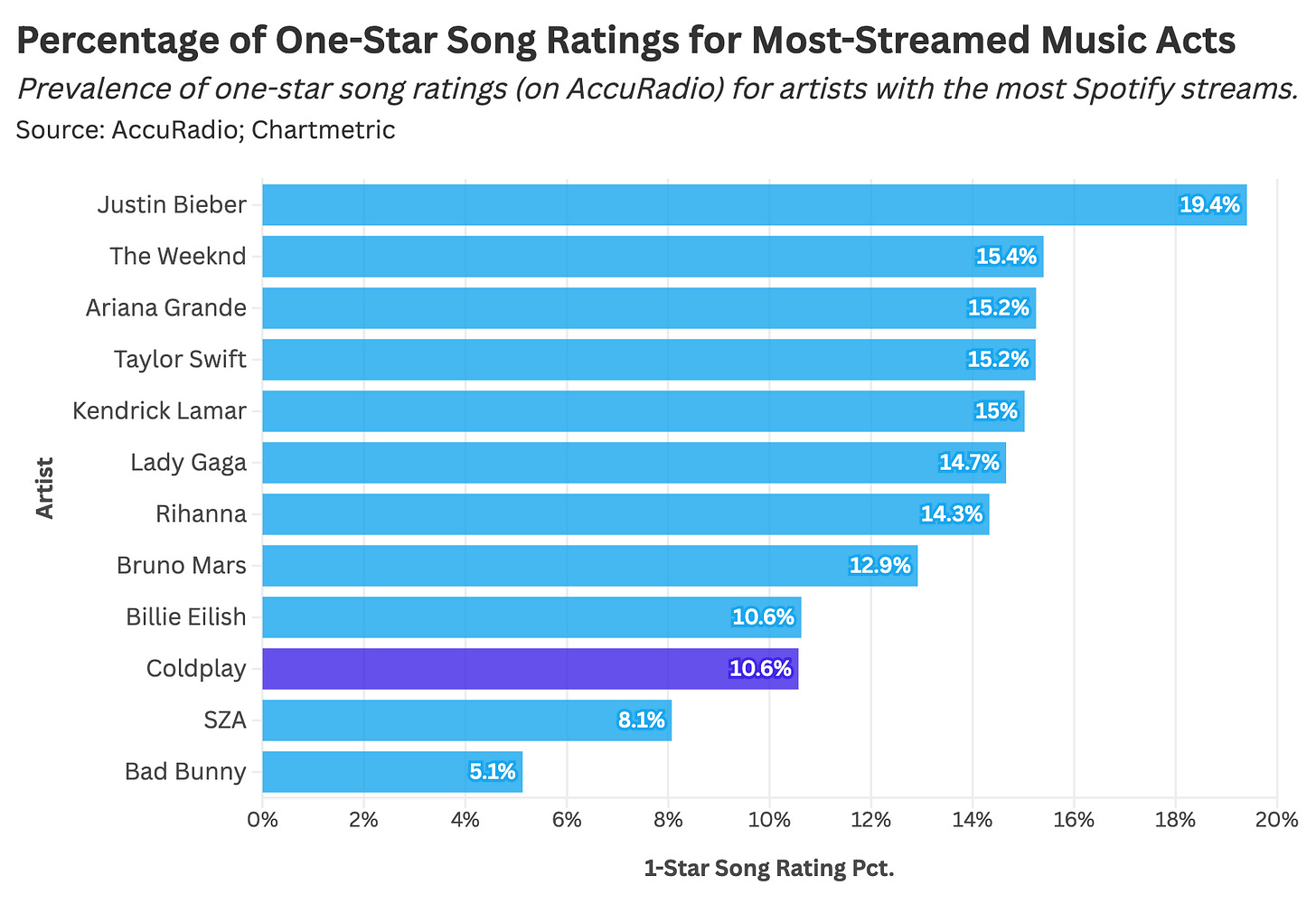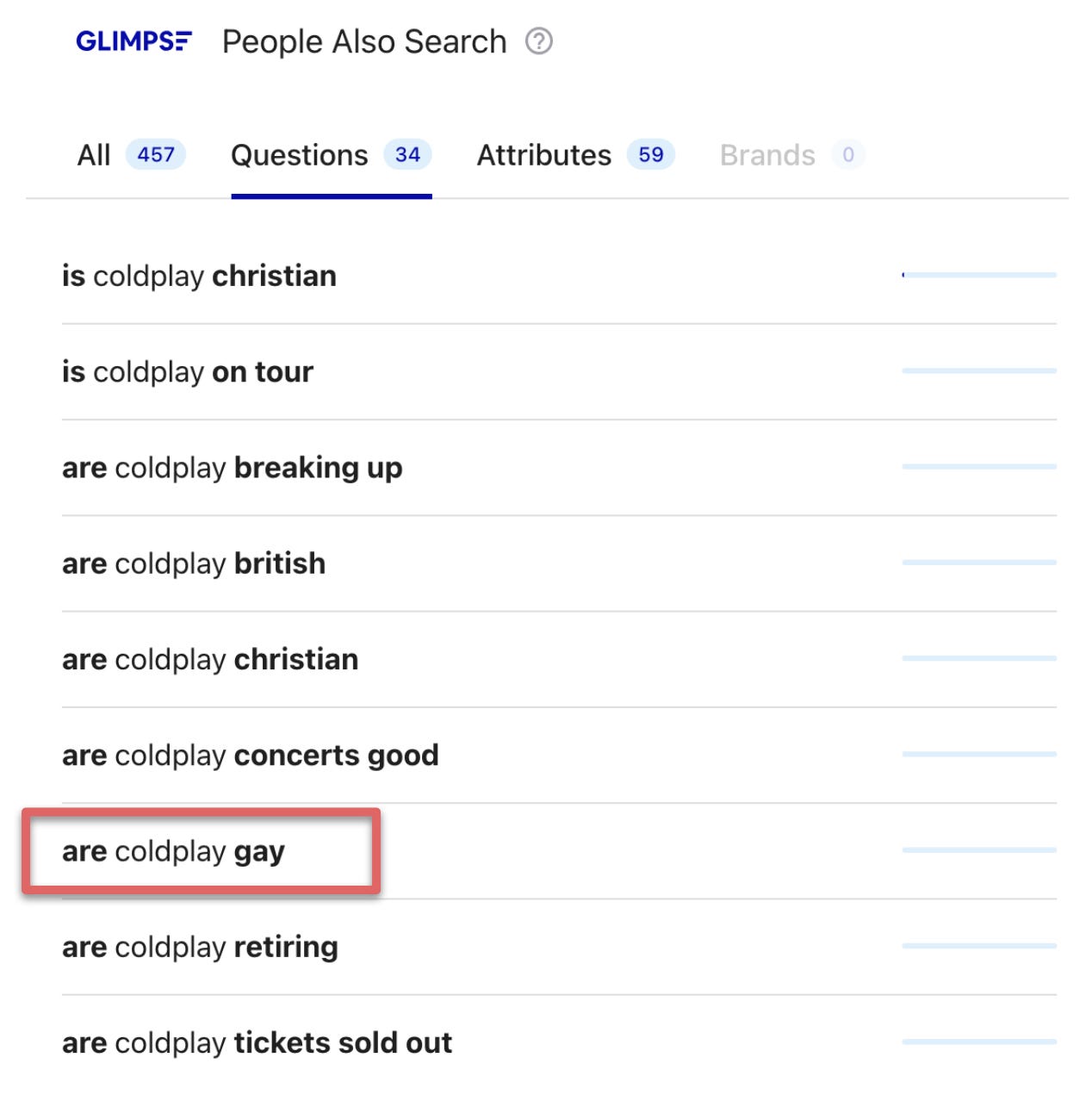Do People Actually Hate Coldplay? A Statistical Analysis
Examining Coldplay's confusing cultural reputation.
Welcome to the 354 new subscribers who signed up for Stat Significant since our last article! I hope you enjoy this week’s deep dive into Coldplay’s perplexing cultural reputation.
If you want to discuss data and statistics or need help with an analytics project, email me at daniel@statsignificant.com or connect with me on LinkedIn.
Intro: Why This Band?
Judd Apatow's 40-Year-Old Virgin singlehandedly destroyed my appreciation for Coldplay. One offhand quip from a raunchy mid-budget comedy bifurcated my relationship with this band into two eras: pre-joke and post-joke.
In a scene that easily qualifies as "something they would definitely not do today," Seth Rogen and Paul Rudd trade barbs about "how [they] know [the other one] is gay." These wisecracks include:
"You know how I know you're gay? Because you make a spinach dip in a loaf of sourdough bread."
"You know how I know you're gay? You like the movie Maid in Manhattan."
And, most relevant to our topic today: "You know how I know you're gay? You like Coldplay."
As an impressionable pre-teen, I was shocked. Was Coldplay taboo? Why did Paul Rudd go after this band? I enjoyed Coldplay like most other people—or at least that's what I assumed.
Since their breakout in the early 2000s, Coldplay has enjoyed surprisingly durable commercial success. Four of their songs have surpassed two billion Spotify streams, and yet this band is frequently the target of online vitriol. The New Yorker and New York Times have declared Coldplay to be "insufferable," while The Guardian dubbed their music "grindingly tedious." Meanwhile, The National—an artist that is Coldplay's opposite—dismissed the band's work as "mundane muzak for the masses." This overwhelming wave of internet hate has solidified Coldplay's place in a canon of pop culture punching bags, alongside figures like Nickelback, Creed, and Steven Seagal.
And yet, despite persistent media attacks, Coldplay's commercial success remains unvarnished as they continue selling out stadiums across the globe (often adding additional shows to meet excess demand). Is this band despised by some silent majority, or is Coldplay more popular than music journalists and message boards would have you believe?
So today, we'll explore Coldplay's confusing cultural reputation and understand why this band is so widely maligned (at least in certain corners of the internet).
Do People Hate Coldplay?
What makes an artist the target of backlash, and how do polarizing sentiments that surround that artist crystallize into a cultural meme? Typically, these conditions spring from a discordant mix of:
Widespread exposure
A vocal contingent of haters
So what makes a band like Coldplay hate-able? A lot of things, unfortunately. Consider this shortlist of spirited grievances:
Coldplay has been a fixture of mainstream culture for nearly 25 years, with an unprecedented run of chart-topping albums. They are one of the most "mainstream" bands of the 21st century.
Coldplay's music is frequently characterized as "overly-sentiment" or "saccharine."
Coldplay's work is often dismissed as gloomy and stylistically bland.
Coldplay lead singer Chris Martin was married to Gwyneth Paltrow for 12 years. The pair famously named their first child "Apple."
And yet, despite this never-ending cavalcade of critique, Coldplay remains one of the most widely streamed music acts of all time. As of February 2025, the band ranked as Spotify's sixth most-streamed artist, trailing the likes of Billie Eilish and Bruno Mars. This feat is all the more impressive given Coldplay's seniority, as they've been making music longer than any of our other top-streamed artists.
Sure, people listen to their music, but that doesn't mean everyone enjoys these songs. Maybe a secret cabal of radio DJs and playlist creators collude as part of the Coldplay Industrial Complex, propping up Big Coldplay through editorialized promotion. These industry insiders must be boosting Coldplay's reach against the will of the masses, right? Assuming Coldplay hatred is real and quantifiable, we should be able to detect a meaningful cohort of detractors.
We'll analyze song rating data from AccuRadio to gauge widespread acclaim for Coldplay and its highly-streamed peers. For those unfamiliar, AccuRadio is a human-curated streaming service that sees over 1.8 billion global track plays per year. The platform allows consumers to score songs on a scale of "1" to "5," with a "1" or "2" rating effectively banning that track from future listening sessions.
Before starting this analysis, I assumed Coldplay would receive abysmal song ratings. Culture critics HATE this band, so you'd expect this disdain to be reflected in the wisdom of crowds, right? Wrong. So wrong.
According to AccuRadio data, Coldplay's average song rating is surprisingly high amongst our cohort of widely streamed artists, while Justin Beiber and Taylor Swift received the lowest marks.
At this point, Coldplay appeared unassailable. I began scavenging for disparate data points that might prove the band's embattled reputation. But alas, the masses really like Coldplay.
So, I formulated a new hypothesis: perhaps there's a silent majority of detractors whose voices are drowned out by an overwhelming wave of Coldplay boosterism. Certain artists are polarizing, cultivating ardent fans and spirited haters—which would yield a mix of "1" and "5" star ratings.
Unfortunately (and/or fortunately), Coldplay has an extremely low percentage of 1-star ratings, especially compared to Justin Beiber's astonishing ~20% 1-star rate.
After several hours of digging, I was unable to find a significant cluster of Coldplay animosity (at a scale that rivals its fandom). People may dislike this band, but their disapproval is easily eclipsed by a legion of "Viva La Vida" loving fanboys and fangirls.
Does this mean that (widespread) Coldplay hatred is a myth? Or is there something about the band's detractors that grants them an outsized voice in pop culture discourse?
Enjoying the article thus far and want more data-centric pop culture content?
The Origins of Coldplay-Bashing
At its best, cultural criticism should guide us toward songs and films "worthy" of patronage, with critics using their taste-making prowess to save the rest of us time.
But what happens when these critics use their powers for evil, deliberately denigrating artists who cater to mainstream tastes? And what happens when critical opinion and public sentiment stand in stark opposition? This tension elevates acts like Nickelback, Creed, and Coldplay into populist icons, prompting the internet to distill their controversial reputations into cultural memes.
Each of these cases involves an artist with a large fanbase who faces sharp criticism from a small yet powerful cabal of critics (I acknowledge I am using the word "cabal" a lot, but how else am I supposed to explain pro- and anti-Coldplay conspiracies?!).
Let's take our same grouping of widely-streamed artists and rank these acts by average Pitchfork album score. Pitchfork—once the epicenter of music criticism (and snobbery)—harbors a particularly strong disdain for Coldplay.
This places Coldplay among an elite group of massively streamed yet critically maligned acts—alongside Imagine Dragons, Ed Sheeran, and The Chainsmokers.
Consider this assortment of Pitchfork digs:
The publication dismissed Coldplay's album Parachutes as "exceedingly generic and immediately forgettable."
Pitchfork's review of 2024's Moon Music remarked, "[This album] demonstrates all the reasons to be sick of Coldplay."
The magazine described 2014's Ghost Stories as "a subdued work" where the band "crisply mopes through mid-tempo soundscapes."
This final observation underscores a frequent criticism leveled against Coldplay: their music is often seen as overly sad, cloyingly saccharine, and excessively sentimental. Believe it or not, this "sentimentality" and "sadness" can be quantified.
Using Spotify's database of music attributes, we can measure how Coldplay song composition compares to other best-selling artists. Among 21st-century artists with at least ten Billboard Top 100 hits, Coldplay registers the lowest Spotify scores for "danceability" and "positivity"—with their marks most closely resembling those of Adele.
There's nothing inherently wrong with these traits—it's simply unusual for a mainstream artist to be renowned for somber, less-danceable songs. Over the past four decades, Top 40 music has become progressively more danceable (according to Spotify's "danceability" metric), which makes Coldplay's decidedly un-danceable style and enduring commercial success all the more remarkable. If nothing else, these facets of song composition set them apart as a highly unique mainstream act—a distinction some might hold against them (especially if they're not into Coldplay's "subdued work").
And yet, meme mythmaking typically arises from a broader set of cultural gripes and misperceptions—not just a handful of Pitchfork pans or complaints of "mopey" music.
Consider Coldplay's well-publicized connection to Gwyneth Paltrow, which has undoubtedly contributed to the band's polarizing reputation. Coldplay's enigmatic lead singer, Chris Martin, was married to Paltrow for nearly 12 years, during which time the couple famously named their first-born "Apple" before "consciously uncoupling" in 2012.
For those unfamiliar, Gwyneth Paltrow has become an increasingly contentious figure in recent years due to the meteoric rise of her wellness brand Goop, which sells pricey and, at times, questionable products (like this now-infamous jade egg).
Nearly 20% of news articles mentioning Coldplay also reference Paltrow, fostering an odd (perhaps somewhat damning) brand association for a band that has never endorsed any jade eggs.
Unfortunately, Paltrow (and Goop) is simply one of many regrettable associations dogging Coldplay. Let's revisit the infamous "you know how I know you're gay" scene from The 40-Year-Old Virgin.
While researching Coldplay search trends, I stumbled upon a data point that underscores the lasting impact of this deliberately juvenile bit.
According to Glimpse, a tool that provides next-level insight into search behavior, one of the most commonly queried Coldplay questions asks, "Are Coldplay gay?"
This question is particularly odd because Coldplay is a group of four people.
Two things can be true in this situation:
There is nothing wrong with someone or something being "gay," as this term is no longer used as a slur for "uncool" or "bad" (like it was in the 1990s and 2000s).
The internet has never been known for its tolerance.
So what's the cumulative effect of these various, often random, stigmas? The negative reviews, the Paltrow association, the "mopey" music, a throwaway joke from a widely seen film, and several other factors culminate in the "Coldplay meme"—reducing the band to shorthand for a mainstream artist unworthy of its vast audience.
Generations of listeners are often introduced to the Coldplay meme before they can form an opinion about the band's music, which spawns a uniquely disjointed cultural reputation.
Consider a recent survey conducted by The Daily Mirror that sought to identify the world's "coolest" and "least cool" music acts. Coldplay was one of three bands that ranked highly on both lists:
The Survey’s "Coolest" Music Artists:
Queen
The Beatles
Ed Sheeran
Abba
Adele
Rolling Stones
Elton John
Jimi Hendrix
Coldplay*
Led Zeppelin
The Survey’s "Least Cool" Music Artists:
Cliff Richard
Daniel O'Donnell
Kanye West
Robbie Williams
Madonna
Elton John
Little Mix
Harry Styles
Ed Sheeran
Abba
Coldplay*
Perhaps Coldplay is worthy of their perplexing legacy—authoring "mundane muzak for the masses"—or maybe this is the price an artist pays for 25 years of mainstream success.
Final Thoughts: Deep Down, We All Love Coldplay
My college put on a regrettable philanthropic event called Dance Marathon, which involved raising money for charity by way of a 30-hour dance party. The social contract underpinning this fundraiser was simple:
A private university student deprives themselves of sleep for 30 hours.
People give them money for their sacrifice, which goes to charity.
To be clear, I am pro-philanthropy and anti-sleep deprivation.
If you're confused about how this exploration of collegiate philanthropy relates to Coldplay—I promise it does!
The experience of Dance Marathon is one of Stockholm Syndrome. Every few hours, the beneficiaries of these charitable donations are brought on stage as a reminder that your sleep deprivation is for a good cause—and then you go back to mindless zombie dancing for another few hours.
At the end of the festivities, a final fundraising total is announced in extremely dramatic fashion. The year I did Dance Marathon, this unveiling was synchronized to the climax of Coldplay's "Fix You." As the song reached its melodramatic finale, someone pushed a button to reveal that we had raised $1.2 million for charity.
It was at this point that everyone in the tent began sobbing, myself included. I'm serious—this actually happened. I've never seen so many people openly weeping at the same time (and I hope I never do again).
After the first few seconds of tears, my brain began cycling through a series of rapid-fire revelations:
"Am I crying?"
"Am I crying to COLDPLAY?"
"ARE ME AND A ROOM OF 300 STRANGERS CRYING TO COLDPLAY SIMULTANEOUSLY?!"
I've always attributed this Coldplay cry-a-thon to sleep deprivation. However, in recent years, I've begun questioning the veracity of this theory.
For much of my life, I've been steered away from the pleasures of Coldplay. I was raised in a milieu of snobbery and was taught that certain things were inherently "bad" or "unbecoming," such as:
The Cheesecake Factory
Marvel movies
Nickelback
Young Sheldon
Cheetos
Michael Bay movies
Jack in the Box tacos
Older Sheldon (in The Big Bang Theory)
Gluten
Reality television
Flaming Hot Cheetos
And, of course, Coldplay
As I've grown older, I've made a conscious effort to let go of these perceptions. Underpinning this notion is a single, unshakable belief: being happy is hard. If eating The Cheesecake Factory while watching The Big Bang Theory and listening to Nickelback brings you joy, then who cares? Why limit the pool of things that bring you happiness, especially if these limitations stem from cultural memes and a cabal of evil critics?
Deep down—somewhere in our "saccharine" little lizard brains—we all love Coldplay. The real question is whether it takes 30 hours of sleep deprivation to finally face this truth.
Struggling With a Data Problem? Stat Significant Can Help!
Having trouble extracting insights from your data? Need assistance on a data or research project? Well, you’re in luck because Stat Significant offers data consulting services and can help with:
Insights: Unlock actionable insights from your data with customized analyses that drive strategic growth and help you make informed decisions.
Dashboard-Building: Transform your data into clear, compelling dashboards that deliver real-time insights.
Data Architecture: Make your existing data usable through extraction, cleaning, transformation, and the creation of data pipelines.
Want to chat? Drop me an email at daniel@statsignificant.com, connect with me on LinkedIn, reply to this email, or book a free data consultation at the link below.
Want to chat about data and statistics? Have an interesting data project? Looking to produce data-centric editorial content? Email daniel@statsignificant.com












I think people like to talk (good or bad) about Coldplay, Winger, Nickelback, Creed, etc. BUT still listen (and see them live) to them as evidenced by the statistics. U2 is definitely in the same boat as Coldplay. I personally love all these bands. THANK YOU for the statistical analysis to back it up. Its a refreshing change from how people on the internet just like to state something as fact without facts!
I never understood this phenomenon. I don’t listen to their new stuff but the old stuff is great. But hey, what do I know? … Now do U2